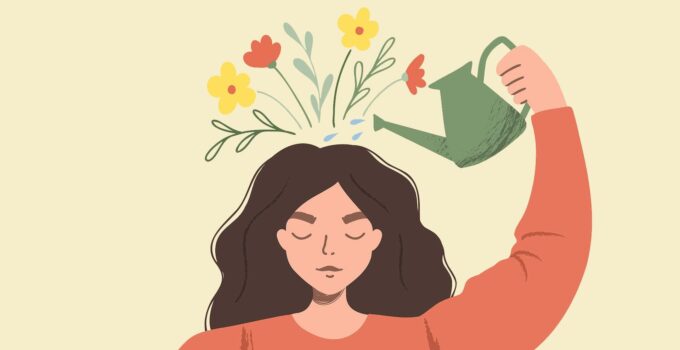Mental health is an issue that affects millions of Americans every day. With rising levels of depression, anxiety, and other mental illnesses, we are facing a crisis in this country that needs to be addressed. Mental health is often overlooked or stigmatized when it comes to discussing public health issues, but the truth is that our society cannot remain healthy if its citizens are not mentally well. We must take steps to ensure people have access to proper mental healthcare resources and support services so they can lead happier and healthier lives.
Additionally, we must reduce the stigma around mental illness by educating ourselves and others about the realities of living with a mental disorder. Only then will we be able to create an environment where people can openly seek help for their struggles without fear or shame?
In this article, we will discuss five easy strategies you can implement that will assist you in recovering your positive mental health once again.
1. Sleeping Is Important

Sleep is an essential part of our lives and plays a major role in maintaining positive mental health. Inadequate sleep can lead to a variety of physical, emotional, cognitive, and social issues that can affect us both short-term and long-term.
Without enough restful sleep, it becomes harder for the body to function optimally and difficult for the mind to cope with daily stressors. Therefore, getting adequate amounts of quality sleep should be a priority if you want to achieve optimal mental health.
One way to ensure you are getting sufficient restful sleep each night is by setting up healthy sleeping habits such as going to bed at the same time each night and avoiding electronic screens before bedtime. Additionally, try your best not to skimp on resting during the day; even if it’s just taking 5 minutes out of your busy schedule for some deep breathing or stretching exercises – any small break from work or school will help reduce fatigue levels throughout the day so that when it comes time for bed you’re ready for restful sleep.
Finally, avoid drinking caffeine late in the day as this can disrupt your natural circadian rhythm which regulates when you feel tired or awake depending on what time of day it is.
2. Exercise Can Improve Mental Health
Physical activity is another key component of maintaining a healthy mental state. Even if it’s just taking a walk around the block or going for a short jog, physical activity can help to reduce stress levels and improve overall mood. Additionally, regular exercise can also release feel-good endorphins which can boost energy levels and help promote positive thinking.
Running is an excellent way to improve your mental health. When you run, your body releases endorphins which are neurotransmitters that act as natural painkillers and have a positive effect on mood. Endorphins can help reduce stress levels, boost energy levels, and help promote positive thinking.
Additionally, running can also be a great form of escapism; it allows us to disconnect from our daily lives for a short period of time so we can focus solely on the present moment without distractions or worries. This sense of mindfulness has been shown to be beneficial in reducing anxiety and depression symptoms over time. By taking advantage of the many benefits that running has to offer, you can become more resilient against life’s challenges while improving your overall mental well-being in the process.
3. Eat Healthy Foods

Source: eatingwell.com
The types of foods we eat play an important role in our mental well-being too. Eating unhealthy processed foods such as sugary snacks or salty chips has been linked to higher levels of stress, anxiety, and depression. Conversely, eating a diet rich in whole grains, fruits, vegetables, nuts, and seeds can help to reduce stress levels while also providing essential vitamins and minerals that the body needs to function optimally.
Additionally, certain foods like fatty fish or dark chocolate contain high amounts of omega-3 fatty acids which are known for their anti-inflammatory properties; these have been linked to improved cognitive performance while protecting against mental illnesses such as dementia and Alzheimer’s Disease. Eating healthy balanced meals on a regular basis will ensure you’re getting all the necessary nutrients your body needs to thrive.
4. Spend Time Outdoors
Spending time outdoors has numerous physical and mental health benefits. Being in nature has been shown to reduce stress levels, improve mood, and increase feelings of well-being. Additionally, outdoor activities such as walking or biking can also help to boost energy levels and promote positive thinking.
When spending time outdoors, try to find a balance between being active and taking the time to relax. Active outdoor activities like hiking or jogging will help you stay physically fit while providing an escape from the daily hustle and bustle of city life.
Alternatively, if you prefer more relaxed activities, take some extra time for yourself at a local park or by the beach; simply sitting outside surrounded by nature can be incredibly calming and restorative for both your mental and physical health.
5. Connect with Natural Herbs

Source: theecologist.org
Connecting with natural herbs and botanicals can be a great way to improve your overall mental health. Herbs such as lavender, chamomile, lemon balm, and passionflower have been used for centuries to promote relaxation and reduce stress levels.
Additionally, studies have shown that certain plant-based supplements like ashwagandha or tea from The Kratom Family, like Kratom green strains, may help to alleviate symptoms of anxiety or depression while also boosting cognitive performance.
Not only are these natural remedies safer than taking prescription medications but they often provide more holistic benefits by addressing the root cause of your mental health issues rather than simply masking them. By connecting with herbal medicine you can take steps towards improving your physical and mental wellbeing all at once – something that is essential in achieving optimal mental health over time.
In Conclusion
Overall, there are a variety of ways to promote optimal mental health. From getting enough quality sleep each night and engaging in regular physical activity to eating healthy foods and connecting with natural herbs, these simple steps can be incredibly beneficial for both your physical and mental well-being over time.
By making an effort to incorporate some of these strategies into your daily life you may find that not only will you feel more relaxed but also happier overall as well. With the right tools at hand, anyone can take charge of their own mental health journey towards achieving greater happiness and resilience against life’s challenges.







